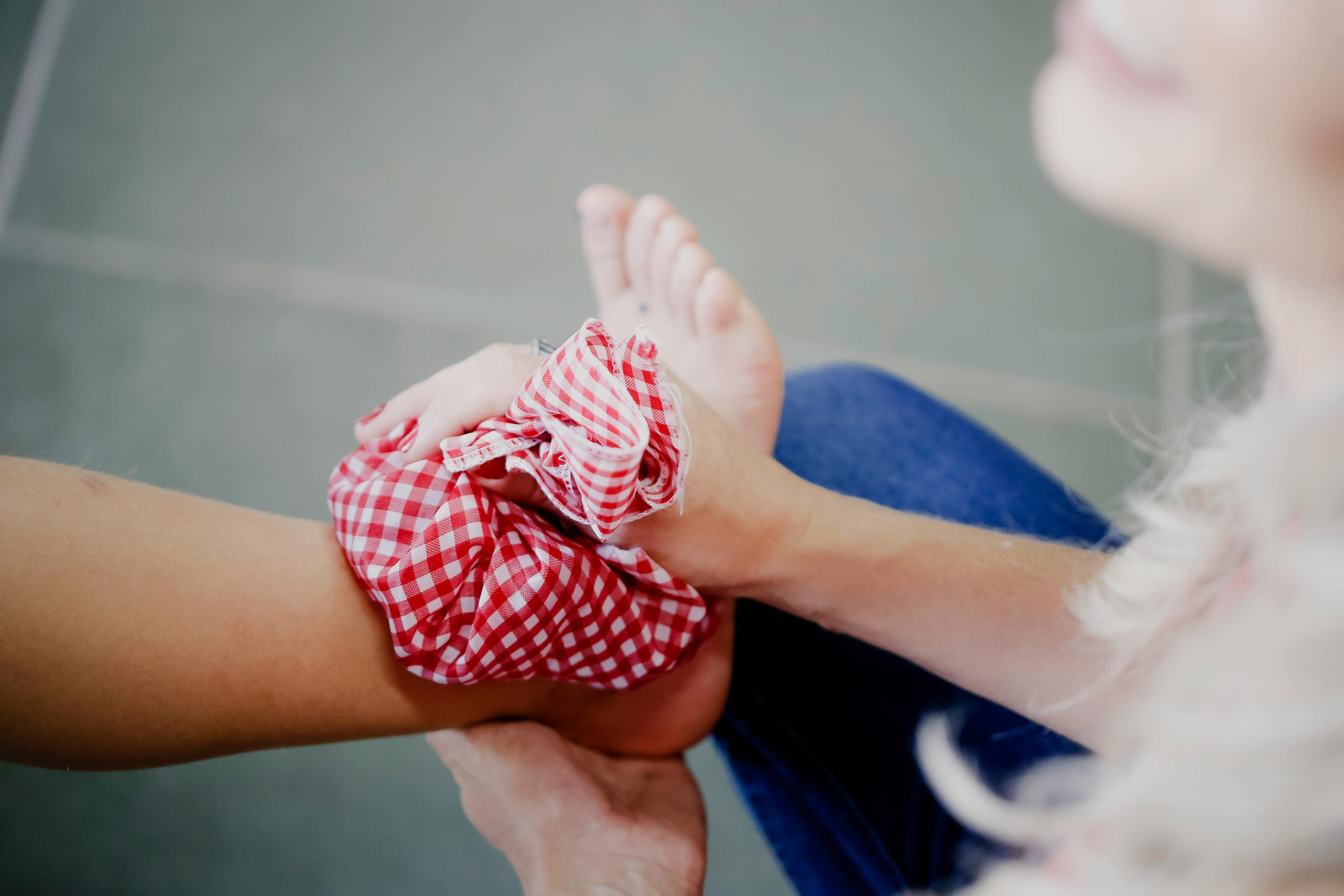
Ankle pain during the day can be annoying, but when it keeps you awake at night, it becomes a real problem. If you’re wondering why your ankle hurts at night while resting, you’re not alone. Many people experience this pain even when they haven’t had a recent injury.
In this article, we’ll explore the common causes of nighttime ankle pain, how to identify symptoms, when to see a doctor, and what you can do to feel better.
Common Causes of Ankle Pain at Night

Nighttime ankle pain can interrupt your rest and leave you feeling frustrated. If you’re wondering why your ankle hurts more while you’re resting or sleeping, here are some of the most common reasons:
- Arthritis
Osteoarthritis and rheumatoid arthritis are two common types that affect the ankle joint. Arthritis causes inflammation in the joints, leading to stiffness and chronic pain. At night, when the ankle is at rest and not moving, that stiffness can become more noticeable.
Signs of arthritis-related ankle pain:
- Stiffness after resting or sleeping
- Swelling around the joint
- Pain that improves slightly with movement
- Warmth or tenderness over the joint
Osteoarthritis is more common with age or prior joint injuries, while rheumatoid arthritis is an autoimmune disease that may affect multiple joints at once.
- Tendinitis
Tendinitis is inflammation of the tendons that attach muscles to bones. In the ankle, this often happens due to overuse, poor footwear, or repeated motion. When you lie down at night, blood flow changes and the lack of movement can make inflammation feel worse.
Common symptoms include:
- Aching pain while at rest
- Swelling or warmth over the tendon
- Pain when pointing, flexing, or rotating your foot
- Tenderness along the tendon (often the Achilles tendon)
Proper stretching and rest can help, but untreated tendinitis may become chronic.
- Ankle Sprains or Old Injuries
If you’ve had a recent ankle sprain—or even one that occurred months ago—you may still feel pain at night. Ligaments take time to heal, and scar tissue or weakened muscles can cause lingering discomfort, especially when circulation slows down at night.
You might notice:
- Throbbing pain while lying in bed
- Swelling that increases at the end of the day
- Stiffness or aching after keeping the foot still
Old injuries can also lead to instability or poor alignment, which contributes to ongoing issues.
- Plantar Fasciitis
Plantar fasciitis affects the plantar fascia—a thick band of tissue that runs along the bottom of your foot. Although it mainly causes heel pain, it can radiate toward the ankle. It’s most painful after resting, such as first thing in the morning or when you’re lying down at night.
Key signs:
- Sharp or burning heel pain
- Aching or tightness in the ankle
- Discomfort that improves once you start walking
- Pain that flares after periods of inactivity
- Gout
Gout is a form of inflammatory arthritis caused by the buildup of uric acid crystals in the joints. While it’s known for attacking the big toe, it can also affect the ankle joint. Nighttime is a common time for gout flare-ups to strike.
What it feels like:
- Sudden, intense pain—often waking you up
- Red, swollen, or hot ankle
- Pain that comes in flares and may disappear for weeks
- Sensitivity to touch, even from a bedsheet
- Nerve Compression or Neuropathy
If nerves near your ankle are compressed or damaged, the pain may become more noticeable at night. Conditions like tarsal tunnel syndrome or diabetic neuropathy often cause symptoms when you’re not moving.
Conditions like:
- Tarsal tunnel syndrome: Compression of the posterior tibial nerve
- Sciatica: Nerve pain radiating from the lower back down to the ankle
- Diabetic neuropathy: Nerve damage due to high blood sugar
Symptoms include:
- Burning or tingling sensation
- Numbness or pins and needles
- Pain that worsens while resting or lying down
- Weakness or unsteadiness
Why Is Ankle Pain Worse at Night?
At night, your body winds down, and you’re not moving around as much. This change in activity, along with shifts in circulation and hormone levels, can make ankle pain more noticeable and intense. Many people find that pain which seemed mild during the day feels sharper or more persistent when trying to sleep.
Here are a few more reasons why ankle pain gets worse at night:
- Lack of movement stiffens joints and tendons. During the day, walking or even just shifting positions helps keep the ankle flexible. But when you rest, especially for long periods, stiffness can build up in the joints and tendons, increasing discomfort.
- Fluid pooling around the ankle after a long day on your feet. Gravity causes fluid to collect in your lower legs and ankles, especially if you’ve been standing or walking a lot. When you lie down, that built-up fluid can create pressure and soreness around the ankle joint.
- Decreased cortisol, the body’s natural anti-inflammatory hormone, at night. Cortisol levels drop as bedtime approaches, which means your body is less equipped to fight off inflammation. This natural dip can make any swelling or irritation in the ankle more painful.
- Increased nerve sensitivity in a quiet environment. When everything is still and quiet at night, your brain pays more attention to physical discomfort. Even minor ankle pain can feel stronger because there are fewer distractions to shift your focus.
- Cooler temperatures may cause joint stiffness. At night, temperatures usually drop. For some people, cooler environments can cause muscles and joints to stiffen slightly, making any ankle issues more noticeable.
- Circulation changes while lying down. Blood flow changes when you shift from standing or sitting to lying flat. In some cases, this can lead to increased pressure in sensitive areas like an injured or inflamed ankle, contributing to pain.
Understanding these factors can help you manage nighttime ankle pain more effectively. Knowing what causes the pain to worsen at night also makes it easier to talk to a doctor and choose the best treatment approach.
When to See a Doctor

You should see a doctor if:
- Pain lasts more than a week
- Swelling doesn’t go down
- You notice bruising or changes in color
- The ankle feels unstable or locks up
- You can’t sleep because of the pain
Even if the pain seems minor, persistent discomfort or swelling can be a sign of a more serious issue like a tendon injury, joint problem, or even a stress fracture. It’s always better to get a professional opinion, especially if the pain is interfering with your daily activities or rest.
Home Remedies for Ankle Pain at Night
You don’t have to live with ankle pain. Try these simple remedies to ease discomfort and sleep more peacefully:
1. Ice the Area
Apply an ice pack wrapped in a thin cloth or towel for 15–20 minutes before bed. Cold therapy helps reduce inflammation, numb the area, and ease the throbbing or aching sensation that often worsens when you’re resting. Avoid placing ice directly on your skin to prevent frostbite.
2. Elevate Your Foot
Raising your ankle on a pillow or folded blanket can improve circulation and help drain excess fluid from the joint. Try keeping your foot elevated slightly above heart level while resting or sleeping. This position can also reduce throbbing and the heavy, swollen feeling that builds up after being on your feet all day.
3. Use Compression
Wearing a light compression sock or an ankle brace at night may help minimize swelling and provide joint support. Compression gently presses on the tissues, which helps prevent fluid buildup and can relieve pressure on sensitive areas. Choose a breathable material and avoid overly tight garments that might restrict blood flow.
4. Take Over-the-Counter Pain Relievers
Non-prescription pain relievers like ibuprofen (Advil, Motrin) or acetaminophen (Tylenol) can be effective at reducing inflammation and easing pain before bed. If your ankle pain is related to arthritis or an old injury, a nighttime dose may help you sleep more comfortably. Always follow dosing instructions and check with your doctor if you take medications regularly.
5. Stretch Your Ankles
Gentle stretching can loosen tight muscles and tendons around the ankle joint. Before bedtime, try slow ankle circles, pointing and flexing your toes, or calf stretches. These simple movements can reduce stiffness and improve flexibility, making nighttime pain less intense.
6. Warm Foot Soak
A warm foot soak can help relax your muscles and improve blood flow to the area. Fill a basin with warm (not hot) water and soak your foot for 15–20 minutes. You can add Epsom salt to the water for extra relief. This can be especially soothing if your ankle pain is caused by overuse or tension.
7. Adjust Your Sleeping Position
Sometimes, the way you sleep puts pressure on your ankle. Try lying on your back with your feet elevated or placing a small cushion under your ankle for support. Avoid sleeping with your foot hanging off the edge of the bed, as this can cause strain overnight.
Long-Term Treatments for Ongoing Ankle Pain
If your pain continues for weeks or months, consider these options with your doctor’s advice:
Physical Therapy
A therapist can guide you through exercises to strengthen your ankle and improve range of motion.
Orthotics
Custom shoe inserts may correct your gait and reduce pressure on your ankle.
Anti-Inflammatory Medications
Your doctor might prescribe stronger medications if over-the-counter options don’t work.
Cortisone Injections
These can provide targeted relief for severe inflammation.
Surgery
In rare cases, surgery may be needed to repair damaged tendons, remove bone spurs, or address joint issues.
Preventing Ankle Pain at Night
The best way to stop ankle pain from ruining your sleep is to prevent it in the first place. Try these steps:
- Wear proper shoes: Supportive footwear helps protect your joints during the day.
- Avoid overuse: Rest between high-impact activities to avoid straining the ankle.
- Maintain a healthy weight: Extra weight adds pressure to joints.
- Stay active: Low-impact activities like swimming and biking help keep your ankles strong without causing damage.
- Warm up & stretch: This prepares your muscles and tendons for activity.
Final Thoughts
Ankle pain at night while resting is a common issue that can be caused by many different factors—from arthritis and old injuries to gout and nerve problems. While it may not always be serious, persistent pain should never be ignored.
You can start with home remedies like ice, elevation, and gentle stretches. But if the pain doesn’t improve, talking to a doctor or physical therapist is a smart next step.


